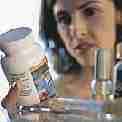MAKING SENSE OF LAB TESTS
Making Sense Of Medical Diagnostic Lab Tests For Fungus, Yeast, Candida, And Parasites
Before reading this page you should review our page on Fungal, Yeast, and Parasite Lab Tests.
As you can see from the associated page describing the available tests, there are many specialized labs that perform a wide variety of specialized tests. The information available from many of these labs is incomplete, making it difficult to determine precisely what tests they offer, which tests include which components, and so on. This page and the page on the tests themselves make an attempt to collect and consolidate useful information. By no means should you consider this attempt to be a definitive analysis of tests and labs. It is intended to be helpful, offering a starting point and guideposts on your journey.
Due to the reasons just stated and the general complexity of the topic, it may be difficult (for any of us) to determine a reasonable approach to selecting tests and labs, but we will take a stab at it. There is no right way and no wrong way. Any systematic approach based on factual information is better than groping along in the dark.
Some things to consider:
- There are health practitioners who are familiar with some of these labs and some of these tests. It's most likely that any individual practitioner is familiar with one or two labs that they use routinely, but don't expect any individual to be broadly familiar with the general topic of labs and tests.
- There are a few online practitioners listed on the Tests page. There are probably many others accessible from the Internet.
- See the page on FINDING A DOCTOR. You may be able to find a healthcare provider (MD, nutritionist, Chiropractor, etc.) in your area with some experience with these specialized labs and tests.
- Note For Parasite Testing: be sure the lab considers D. fragilis and B. hominis to be pathogens, and that the procedures they use will isolate and detect these organisms.
KEY
|
SUMMARY OF AVAILABLE TESTS
|
MAKING SENSE OF THE TESTS
If you are starting from the beginning, the Candida Questionnaires (short, or long) may be useful to consolidate your sense of "I feel awful" into identifiable categories, and to establish a benchmark that you can come back to in evaluating your own improvement (or lack of improvement).
Then, you need proof positive to confirm your suspicions. (This methodology is exactly the opposite of the standard medical approach, which is to conduct tests to "rule out" possibilities. The approach presented here is an empirical approach in which you start with a hypothesis and drive to a conclusion.) There is no right way to do this, since there are several alternatives given the spectrum of available tests.
If your illness could be originating from something other than intestinal Candida -- a chronic cough, perhaps, suggesting that it might be a low-grade fungal infection of the lungs (like Valley Fever in Arizona) -- then the fungal antibody tests from Labcorp or Quest might be revealing.
If Candida or other intestinal infection is more likely, then you probably want to do at least two different tests to minimize the possibility of a test showing a false negative:
- The gold standard is a stool test with visual confirmation of pathogens as well as culture and sensitivity to identify the specific agents and their susceptibility to medications. Any of the labs with ”Y” in that row seem like good sources.
- In addition, an antibody test should show positive confirmation of a yeast infection.
- Since the antibody tests that include immune complexes are more revealing, one of the three vendors with ”Y” in the row "Candida antibody with immune complexes" would be good choices. Immunosciences Lab also runs antibody tests for several bacteria and parasites. That might provide useful information, but the scope of the tests are limited so a negative result doesn't mean that you don't have an intestinal bacteria or parasite infection -- just not from one of the bugs they test for.
- Alternatively, you could opt for a saliva antibody test -- certainly less painful than a blood draw. (And, while we don't have any pricing information here, this might be an inexpensive test.)
Supplemental tests:
- Leaky gut or intestinal permeability tests might help identify the source of allergies and similar adverse immune responses, and can serve as a guidepost to the healing process.
- An organic acid test can help to confirm a diagnosis of intestinal infection. In addition, the test from Great Plains Lab can give insight into dysfunctional metabolic processes, and in doing so, identify supplements that may be helpful during the healing process. It also may be revealing and especially important if you suspect that a Candida infection may underlie a serious disease such as autism, ADD, Alzheimer's, and so on.
- The indican test might be an easy way to gauge progress during therapy, but it is an indirect measurement of intestinal function and therefore not a primary diagnostic tool -- its results are less conclusive and will certainly be less convincing if you are dealing with conventional medical practitioners.




